Baker Apologetics Collection (5 vols.)
Digital Logos Edition
Overview
This collection contains five volumes dealing with various aspects of apologetics. It focuses on core, contemporary apologetic issues like evil, Scripture’s inerrancy, religious pluralism, and postmodernism.
Discover various approaches to sharing your faith with nonbelievers. Explore and analyze current physicalist/naturalist views on human nature, creativity, and consciousness. Observe a futuristic debate between Christianity’s St. Paul and Islam’s Muhammad as they address the validity of their religious doctrines, cite primary sources, and argue over one of the biggest defining aspects of their religions: the validity of Jesus’ resurrection. Learn about present strategies to defend the belief in moral absolutes while recognizing moral relativism’s logical inconsistencies, growth in the past decades, and political and social influences.
In a solid, scriptural, and non-technical way, the Baker Apologetics Collection brings beginning and experienced apologist insight on today’s philosophical issues, while firmly defending the Christian faith.
The Logos Bible Software edition of the Baker Apologetics Collection is designed to encourage and stimulate your study and understanding of the Christian faith. Scripture passages link directly to your English translations and to the original language texts, and important apologetic concepts link to dictionaries, encyclopedias, and a wealth of other resources in your digital library. In addition, you can perform powerful searches by topic and find what other authors, scholars, and theologians have to say about moral relativism, Jesus’ resurrection, and personhood.
Key Features
- Addresses contemporary philosophical issues
- Defends the Christian faith, Jesus’ resurrection, and Scripture’s inerrancy
- Includes helps for sharing your faith with nonbelievers
Product Details
- Title: Baker Apologetics Collection
- Publisher: Baker
- Volumes: 5
- Pages: 1,232
- Resource Type: Topical
- Topic: Apologetics
Individual Titles
- Introducing Apologetics: Cultivating Christian Commitment by James E. Taylor
- Mere Apologetics: How to Help Seekers and Skeptics Find Faith by Alister E. McGrath
- Paul Meets Muhammad: A Christian-Muslim Debate on the Resurrection by Michael R. Licona
- Relativism: Feet Firmly Planted in Mid-Air by Francis J. Beckwith and Gregory Koukl
- Scaling the Secular City: A Defense of Christianity by J.P. Moreland
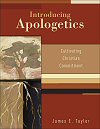
In this stalwart defense of the Christian faith, James Taylor offers a balanced and comprehensive treatment of the core apologetic issues facing believers in the twenty-first century. Sample topics include:
- Worldviews
- The problem of evil
- The life, death, and resurrection of Jesus Christ
- Scriptural canonicity and authority
- Religious pluralism
- Postmodernism
- Ethical relativism
Each of the book’s 25 chapters contains an outline, summary, list of basic terms, reflection and discussion questions, and guide to further reading. Chapter overviews enhance this readable text.
What distinguishes this work is its tone, which is neither strident nor polemical. Instead, Taylor’s arguments are sensitive, winsome, humble, and fair-minded, especially with respect to his treatment of philosophical and religious systems that challenge Christianity. Unique to Taylor’s approach is his vision of apologetics as a discipline that should ideally lead to Christian commitment, discipleship, and spiritual transformation.
Introducing Apologetics will appeal to college and seminary students as well as anyone who thinks deeply about the rationality and tenability of a Christian worldview. This work is destined to become a seminal textbook and a welcome contribution to the apologetic endeavor of the twenty-first century.
This book is a thoughtful introduction to Christian apologetics that is focused on the needs and interests of students but embodies a deep understanding of the underlying philosophical issues. It is a wise and helpful book.
—C. Stephen Evans, professor of philosophy and humanities, Baylor University
Apologetics books are notorious for their struggle to find ways to be comprehensive, cutting edge, accessible, and relevant. Those that succeed at some tasks typically fail at others. Introducing Apologetics offers a refreshingly rare balance of these coveted traits. Readers can expect to be treated to the full range of traditional apologetic topics as well as to many that have only recently emerged as important. In addition, Taylor offers the reader sober, practical advice on the extent and limits of apologetics in the life of the Christian and in the Christian’s attempt to reason together with non-Christians. Finally, though each chapter is deeply informed by the most recent scholarship, it is thoroughly accessible, even to those with no prior exposure to the topics it treats. Here is a resource that belongs in every thinking Christian’s library.
—Michael J. Murray, executive vice president of programs and evaluation departments, John Templeton Foundation
Taylor wrote this work as a college textbook with outlines of each chapter, lists of terms and people in each chapter, and review questions. It is both well-organized and highly user-friendly. . . . Taylor carefully crafted his work to help Christians understand who they are and what they believe as they are bombarded by the contemporary philosophies of our day. From a missiological perspective, the author approaches his subject with a Western mindset. He does an excellent job.
—Missiology
In this introductory text on Christian apologetics, Taylor steers a middle course between ‘an overemphasis on reason and an overemphasis on faith.’ . . . Taylor shows familiarity with the relevant literature. . . . While there is nothing here that contradicts Catholic or Orthodox Christianity (and much in support), this text defends Christianity more broadly. . . . The text is readable and ideally suited for introductory courses on Christian apologetics, especially at the undergraduate level, and at evangelical institutions.
—Religious Studies Review
This is a very significant new text in apologetics. Taylor is so very insightful on so many issues. . . . One will learn much even in those sections where one feels compelled to disagree. The writing style is not overly technical.
—Faith & Mission
James E. Taylor is professor of philosophy at Westmont College in Santa Barbara, California. He formerly taught at Bowling Green State University, Bowling Green, Ohio.
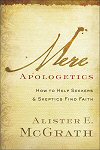
Throughout history there have been great and articulate defenders of the faith. But with the new challenges of scientific atheism we see in our day, there is a need for a fresh and flexible approach to apologetics. Rather than supplying the fine detail of every apologetic issue in order to win arguments, Mere Apologetics teaches a method that appeals not only to the mind but also to the heart and the imagination.
After discussing the biblical basis for and historical uses of apologetics, McGrath offers various approaches to sharing your faith with others. He outlines pointers to faith, such as our innate sense of longing for justice, our appreciation for beauty, the order we see in the physical world, and much more. He also shows how there are many right ways to share your faith—through explanations, arguments, stories, and images—and helps you decide which works best for your personality and your audience.
“Apologetics is not to be seen as a defensive and hostile reaction against the world,” says McGrath, “but as a welcome opportunity to exhibit, celebrate, and display the treasure chest of the Christian faith.” If you long to commend your faith to those outside the church, Mere Apologetics will show you how to do so gracefully and effectively.
This is a fresh, clear, and practical introduction to apologetics from someone who doesn’t just talk about the subject but actually does it brilliantly. It is especially helpful because it avoids the fruitless wrangling between apologetic schools that stops many people from getting on with the task.
—Os Guinness, author and social critic
Mere Apologetics helps readers work out their own way to effectively communicate and defend the Gospel. An excellent text for courses in apologetics. A great read for both beginning and experienced apologists.
—Jim Sire, former editor, InterVarsity Press
Over the years I have found Alister McGrath to be an insightful, wise guide on many topics. So I am pleased to recommend his book on apologetics. It is foundational, practical, and creative as well as faithful to Scripture. A fine resource indeed!
—Paul Copan, professor, Palm Beach Atlantic University
Alister E. McGrath is professor of theology, ministry, and education, and head of the Centre for Theology, Religion, and Culture at King’s College, London. He is the author and editor of numerous books, including the award-winning The Passionate Intellect: Christian Faith and the Discipleship of the Mind. A former atheist, he is respectful yet critical of the new atheist movement and regularly engages in debate and dialogue with its leaders.
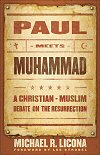
Imagine a crowded arena full of Christians, Muslims, and curious onlookers packed in to hear the outcome of one of the greatest debates in all of history. If Jesus didn’t rise from the dead, Christianity is false. But if Jesus was resurrected, Christianity is true and Islam is false. The stakes are high.
Paul Meets Muhammad imagines a futuristic face-off between two religious heavyweights, each speaking on the validity of their doctrines, forming arguments and rebuttals while citing evidence from the Qur’an and the Gospel accounts. Intriguing and entertaining, this page-turner uniquely offers a comprehensive defense of Jesus’ resurrection and of Christianity itself.
In a day of heightened awareness of Islam in the West, it is vitally important that Christians know how to give an answer when asked by a Muslim for the hope that is in us. Since the Qur’an denies the historicity of the crucifixion, burial, and resurrection of Jesus, the evidence for these events constitutes justification for thinking that Christianity rather than Islam gives us the truth about Jesus and the God he revealed. In this book Licona not only marshals that evidence but also refutes the typical objections brought by Muslim apologists against it.
—William Lane Craig, research professor of philosophy, Talbot School of Theology
The Islam/Christian debate all comes down to whether Jesus rose from the dead shortly after his crucifixion. If he did not, then Christianity is a sham. In his book, Paul Meets Muhammad, Michael Licona entertains and educated the reader in an ingeniously crafted debate that is fair to both sides. If you are a Christian looking for a resource on how to share your faith with your Muslim friend, look no further.
—D. James Kennedy, former senior minister, Coral Ridge Presbyterian Church, Fort Lauderdale, FL
Reconstructing debates between the greats of the past is a clever device occasionally attempted in the media-printed or aired-but never with such success as in Paul Meets Muhammad. St. Paul debating Muhammad? Forget the time warp and simply enjoy the interchange! Since Michael Licona is fast becoming one of Christianity’s most eloquent apologists for the Resurrection, you will assume a strong, pro-Christian bias in this book (St. Paul will have all the good lines and Muhammad the bad) but you will be wrong! Licona brilliantly presents also the Muslim arguments at the heart of the Christian-Muslim dialogue, claims that Jesus never died and so could not have been resurrected. Since the Muslim challenge to the church is becoming more acute each passing day, it is well for Christians to arm themselves with the arsenal of arguments presented in these pages.
—Paul L. Maier, Emeritus Russell H. Seibert Professor of Ancient History, Western Michigan University
This brilliant idea for reconstructing a dialogue between Paul and Mohammad plainly indicates Mike Licona’s mastery of the subject matter of Jesus’ resurrection. Islam postulates an alternate theory that is supernatural in nature. This book successfully critiques this approach and needs to be read by any Christian desiring to have constructive dialogue with Muslims. Since Mike’s presentation of the Muslim view is actually stronger than I have heard presented by Muslim scholars, Muslims should enjoy reading it, too!
—Gary Habermas, distinguished professor of apologetics and philosophy, Liberty University
Paul Meets Muhammad is appropriately titled. In this book Michael Licona makes plain the differences that exist between Christianity and Islam concerning the central truth of the Christian faith: the historical, bodily resurrection of Jesus, the Son of God. The debate format between the apostle Paul and the prophet Muhammad will draw one quickly into the discussion. Licona’s treatment of the issue, fiat and balanced, draws on primary sources which allows each side to speak for themselves. The importance of historically credible evidence, careful reasoning, and logical consistency are clearly demonstrated. Read this book and learn. Read this book and be challenged. Read this book and see evidence mount for the empty tomb and the supernatural resurrection of Jesus Christ.
—Daniel L. Akin, president, Southeastern Baptist Theological Seminary
Michael R. Licona is associate professor of theology at Houston Baptist University and president of Risen Jesus, Inc. He has a PhD in New Testament Studies from the University of Pretoria, which he earned with distinction and the highest mark. He is the author of numerous books including The Resurrection of Jesus: A New Historiographical Approach, co-author with Gary Habermas of the award-winning book The Case for the Resurrection of Jesus, and co-editor with William Dembski of Evidence for God: 50 Arguments for Faith from the Bible, History, Philosophy, and Science. He has spoken on more than 70 university campuses and has appeared on dozens of radio and television programs.
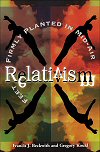
Many Christians are concerned about the tide of moral relativism that is rising steadily in our country—and rightly so. Relativism affects our education system, the legal system, and how people think about everyday issues. Yet little has been written on the topic outside academic circles.
This void is filled by Frank Beckwith and Greg Koukl, who analyze relativism and present strategies to defend the belief in moral absolutes. Using a commonsense approach, Koukl defines relativism, traces its growth over the past few decades, and critiques the logical inconsistencies to which its supporters are led. He then presents a case for moral objectivism. Beckwith, building on Koukl’s foundation, evaluates the influence of relativism on issues including abortion, homosexuality, political correctness, multiculturalism, and tolerance. In each of these areas, he provides compelling arguments for thinking people.
Following in the tradition of C.S. Lewis and Francis Schaeffer, Relativism is an important guide for those who are concerned about intellectual issues that challenge the Christian faith.
Brisk, logical, and thoroughly practical, this is simply the best and most accessible book on the subject for general readers. It’s ideal for ordinary people trying to find sense under the assault of senselessness in private and public life. You can be sure I’ll recommend it highly to my students.
—J. Budziszewski, professor of government, The University of Texas at Austin
A good book to help us see not only the absurdity of moral relativism, but also the disastrously dangerous application of it. I believe the authors have fulfilled their purpose not only to critique this ‘unofficial creed’ of our American culture, but to show us how we can challenge it, stand against it, and be equipped not to cave in to its ungodly philosophy and practice. . . . Preachers, teachers, parents, junior high, and high school students should read this book. This would be a good book for those working with the teenagers of the millennial generation to use for study and discussion. . . . In the tradition of Francis Schaeffer and C.S. Lewis, this book will be a helpful tool in your case of resources to carry out your calling to ‘serve God’s purpose in this generation.’ The authors are to be commended not only for their effort to explain moral relativism, but for their ideas and suggestions for students and adults to respond properly and accordingly.
—Equip for Ministry
In this entertaining and concise debunking of relativism, mssrs. Beckwith and Koukl unmask it for the intellectual farce it is. Throughout their book, they emphatically show that all relativism is necessarily self-refuting, that is, it contradicts itself. . . . An excellent apologetic tool for defending biblical morality. . . . The urgent prescription for our confused culture.
—Southern California Christian Times
An extremely well-researched, intellectual approach to the problem of relativism and its effect on education, public policy, and our everyday lives.
—Youthworker
With great skill, convincing analysis, and cultural relevance, the authors show how relativism is both dangerous and widespread in today’s world.
—Fresh Pages and Tapes
As a wonderfully incisive critique of the prevalent forms of moral relativism, this book prepares Christians to thoughtfully engage the moral relativist in fruitful discussion, leading to the refutation of the relativist’s position while replacing it with a well-founded and biblically consistent moral objectivism.
—Christian Research Journal
This easy-to-follow book will be a very useful companion for anyone seeking to expose the flabby reasoning of contemporary liberalism.
—The National Educator
A work in ‘philosophical apologetics,’ Relativism: Feet Firmly Planted in Mid-Air addresses the origin and nature of truth. It is of the same caliber as the writings of Os Guinness, Francis Schaeffer, and C.S. Lewis. Again, it is one of a few titles that solely focus on relativism; for this reason, it is unique.
—Christian Library Journal
Francis J. Beckwith is professor of philosophy and church-state studies, and codirector of the program in philosophical studies of religion in the Institute for Studies of Religion, at Baylor University in Waco, Texas. He is the author or coauthor of numerous books, including Defending Life: A Moral and Legal Case against Abortion Choice and To Everyone an Answer: A Case for the Christian Worldview.
Gregory Koukl (born June 10, 1950) is a Christian, radio talk show host, author and speaker/teacher. He is the founder of Stand To Reason, a Christian organization dedicated to the articulation and defense of the Christian worldview. Greg Koukl is known for his defense of classical Christianity and classical Christian values, and is also well known for being an advocate of the Pro-Life position.
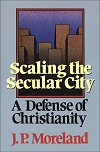
Here are up-to-date arguments for God’s existence and for Jesus’ deity and resurrection, answers to objections to Christian theism, and discussions of four key issues.
No evangelical now writing on apologetics surpasses Moreland in philosophical ability. Every person who intends to speak for Christ to the contemporary mind should master the content and spirit of this book.
—Dallas Willard, professor of philosophy, The University of Southern California
Scaling the Secular City is the most sophisticated apologetics book I have read. It lays out the issues, arguments, and counterarguments in a thorough way. Moreland’s special strength lies in philosophy of science, and the book makes a real advance in the interface between Christianity and science.
—William Lane Craig, research professor of philosophy, Talbot School of Theology
[This] is not just another apologetics book. This is a fresh, up-to-date defense of the Christian faith by a bright mind. J.P. Moreland musters new arguments, tackles new problems, and reveals penetrating insight. . . . His insights into the contemporary philosophical issues make him one of the ablest young apologists in America.
—Norman L. Geisler, cofounder, Southern Evangelical Seminary
J.P. Moreland is a distinguished professor of philosophy at Talbot School of Theology. He has authored or coauthored many books, including Love Your God with All Your Mind and Immortality: The Other Side of Death.
